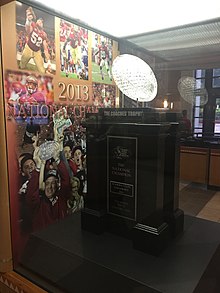Florida State Seminoles football
[6] The team has produced three Heisman Trophy winners: quarterbacks Charlie Ward in 1993, Chris Weinke in 2000 and Jameis Winston in 2013.
The Biletnikoff Award, presented annually to the top receiver in college football, is named for Florida State hall of fame player Fred Biletnikoff and the Bobby Bowden Award, presented by the Fellowship of Christian Athletes, is named after Florida State hall of fame coach Bobby Bowden.
Florida State's football program was first established in 1902, resuming play and adopting the 'Seminole' nickname in 1947, after forty-six years.
[15] The end of World War II brought enormous pressure on the university system in Florida, which saw an influx of veterans applying for college under the GI Bill.
Under Peterson's direction, the Seminoles beat the Florida Gators for the first time in 1964 and earned their first major bowl bid.
[19] In the summer of 1967, Peterson also engineered another first for the Seminole program when he decided to begin the recruitment of African American football players.
In the fall of 1968, Patterson would become the first African American student to play for the Seminoles as a starter for the Florida State freshmen football team.
FSU also set an NCAA record for most consecutive Top 5 finishes in the AP football poll – receiving placement 14 years in a row, from 1987 to 2000.
In the Bowden era, prior to a 1989 game against long-standing rival Miami, University of Miami mascot Sebastian the Ibis was tackled by a group of police officers at Doak Campbell Stadium in Tallahassee as the mascot attempted to put out Chief Osceola's flaming spear.
University of Miami quarterback Gino Torretta told ESPN, "Even if we weren't bad boys, it added to the mystique that, 'Man, look, even their mascot's getting arrested.
In the spring of 2007, several FSU athletes including football players were accused of cheating in an online music history class.
[27] On January 5, 2010, Jimbo Fisher officially became the ninth head football coach in Florida State history.
Fisher's second Florida State team also defeated Notre Dame in the Champs Sports Bowl.
In his third season, he led the Seminoles to their first conference title in seven years and defeated Northern Illinois to win the Orange Bowl.
In the 2013 season, Jimbo Fisher guided his team to a perfect 14–0 record and a national championship with a comeback win against Auburn.
[33] In 2022, Mike Norvell led the Seminoles to a 9–3 regular season record and a berth in the 2022 Cheez-It Bowl to play against Oklahoma.
The 2023 team was excluded from the College Football Playoff despite finishing the regular season as undefeated ACC champions.
[42] The Seminoles entered 1993 with a number one ranking and were led by quarterback and eventual Heisman Trophy winner Charlie Ward.
The only loss of the season came at second-ranked and undefeated Notre Dame by a score of 31–24, in one of the greatest games in college football history.
The 2013 Seminoles would hand then third ranked Clemson their worst home loss, set a new attendance record at Doak Campbell Stadium of 84,409 against the seventh ranked Miami Hurricanes, and set a school scoring record of 80 points in a game against the University of Idaho behind freshman quarterback and eventual Heisman Trophy winner Jameis Winston.
[44][45][46] Bobby Bowden, who spent 34 years at Florida State, is the winningest coach in school history and has been inducted into the College Football Hall of Fame.
Since that time, the stadium has expanded to almost 83,000, largely due to the success of the football team under head coach Bobby Bowden coupled with the ever-growing student body.
The rivalry has been popular not only because of its profound national championship implications and the competitiveness of the games but also because of the immense NFL-caliber talent typically present on the field when the two teams meet.
The idea of finally having a trophy for the round robin winner between the three schools was enthusiastically endorsed by then governor Jeb Bush.
One sticking point in the rivalry remains that a proud Clemson Tiger program that was strong in the 1980s had won 6 of the past 11 ACC titles from 1981 to 1991.
The team's uniforms pay respect to the Seminole culture using tribal influences with Native American symbols representing an arrow, a man on a horse, and fire.
The War Chant would be adopted by the Atlanta Braves when FSU football alumnus Deion Sanders joined the team, and has been used ever since.
Team captain Gene McDowell pulled a small piece of grass from the field, which was presented to Moore at the next football practice.
Moore and FSU coach Bill Peterson had the sod buried on the practice field as a symbol of victory.
Victorious captains return with a piece of the opponent's turf to be buried in the Sod Cemetery inside the gates of the practice field.


































